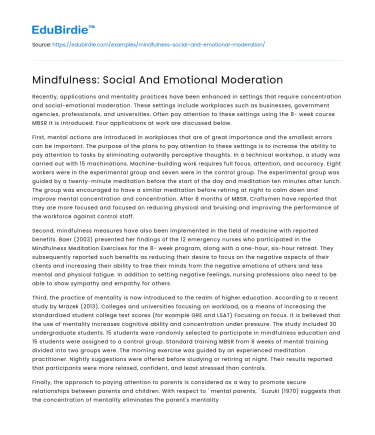Introduction
Mindfulness, a concept rooted in ancient spiritual practices, has emerged as a pivotal tool in modern psychological and educational frameworks. At its core, mindfulness involves a heightened state of awareness, wherein individuals engage fully with the present moment. This practice not only enhances personal well-being but also plays a crucial role in moderating social and emotional responses. In an era characterized by rapid technological advancements and increasing societal pressures, the ability to maintain emotional equilibrium and foster positive social interactions is more vital than ever. This essay explores the multifaceted impact of mindfulness on social and emotional moderation, examining its benefits, challenges, and practical applications. Through an analysis of current research and real-world examples, this discussion aims to illuminate the profound ways in which mindfulness can transform individual and collective experiences.
Enhancing Emotional Regulation Through Mindfulness
Emotional regulation is a fundamental aspect of psychological health and well-being. Mindfulness practices, such as meditation and mindful breathing, offer individuals the tools necessary to navigate their emotional landscapes with greater ease. According to a study by Farb et al. (2010), mindfulness training enhances the ability to distinguish between different emotional states, thereby facilitating better emotional regulation. By cultivating a non-judgmental awareness of one's feelings, individuals can respond to emotional stimuli with increased clarity and reduced reactivity.
Real-life applications of mindfulness in emotional regulation are evident in various therapeutic settings. For instance, Mindfulness-Based Stress Reduction (MBSR) and Mindfulness-Based Cognitive Therapy (MBCT) are widely used interventions that have demonstrated efficacy in reducing symptoms of anxiety and depression (Kabat-Zinn, 1990; Segal et al., 2002). These programs teach individuals to observe their thoughts and emotions without attachment, allowing them to break free from negative thought cycles.
However, some critics argue that the benefits of mindfulness may be overstated. A meta-analysis by Goyal et al. (2014) suggests that while mindfulness practices lead to moderate improvements in anxiety, depression, and pain, they may not be significantly more effective than other types of interventions. Despite this, the growing body of evidence supporting mindfulness as a tool for emotional moderation cannot be overlooked. By integrating mindfulness into daily routines, individuals can enhance their emotional resilience, leading to improved mental health outcomes.
Transitioning from emotional regulation, we turn our attention to the impact of mindfulness on social dynamics. As individuals gain better control over their emotions, they are better equipped to engage in meaningful social interactions. This shift in focus highlights the interconnectedness of emotional and social well-being, underscoring the comprehensive benefits of mindfulness practices.
Mindfulness and Social Interaction
The social dimension of mindfulness is increasingly recognized for its potential to enhance interpersonal relationships and communication. By fostering a mindful awareness of oneself and others, individuals can create more empathetic and compassionate social environments. Research by Condon et al. (2013) found that individuals who engaged in mindfulness meditation demonstrated increased altruistic behavior and empathy towards others. This suggests that mindfulness can play a significant role in promoting prosocial behavior.
One practical example of mindfulness in action is its application in educational settings. Programs such as the Mindful Schools initiative have integrated mindfulness practices into classrooms, with the aim of improving students' social-emotional skills. These programs have reported positive outcomes, including increased attentiveness, better emotional control, and improved peer relationships (Schonert-Reichl & Lawlor, 2010).
Despite these positive findings, some researchers caution against viewing mindfulness as a panacea for social challenges. Critics like Purser and Loy (2013) argue that mindfulness, when stripped of its ethical and philosophical roots, risks becoming a tool for self-centered enhancement rather than genuine social improvement. However, when mindfulness is practiced with an emphasis on compassion and empathy, it holds the potential to transform social interactions and build more cohesive communities.
As we transition to the conclusion, it is essential to consider the broader implications of mindfulness on both individual and societal levels. The interconnectedness of emotional and social moderation through mindfulness provides a strong foundation for fostering holistic well-being in diverse settings.
Conclusion
In conclusion, mindfulness serves as a powerful mechanism for achieving social and emotional moderation. Through its capacity to enhance emotional regulation and promote positive social interactions, mindfulness contributes to overall psychological well-being. While challenges and criticisms exist, the evidence supporting the benefits of mindfulness is compelling. By integrating mindfulness into various facets of life, individuals and communities can navigate the complexities of modern society with greater ease and resilience. As mindfulness continues to gain traction in psychological and educational domains, its potential to foster a more empathetic and emotionally balanced society becomes increasingly apparent. Embracing mindfulness as a tool for social and emotional moderation not only enriches individual lives but also paves the way for more harmonious and connected communities.






 Stuck on your essay?
Stuck on your essay?

